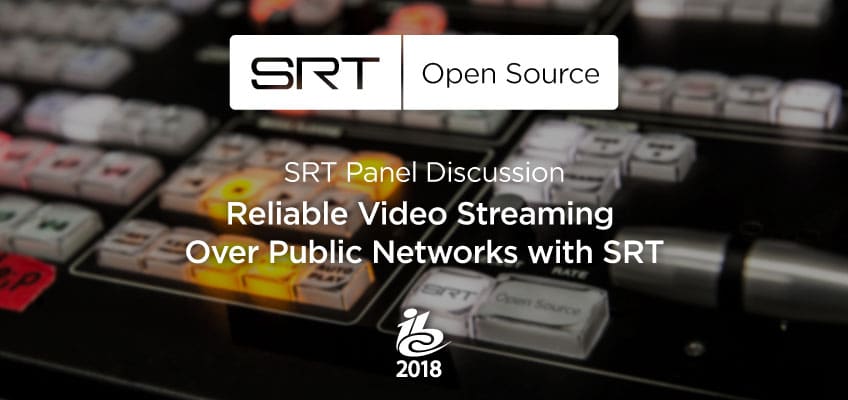Since its launch in April 2017 at that year’s NAB Show, the Secure Reliable Transport (SRT) open source protocol has seen widespread adoption over multiple markets where high-quality, low-latency video streaming is crucial.
It has been amazing to see such a remarkably diverse group of businesses adopting the SRT protocol—many of them in the broadcast space.
Are you lucky enough to be on your way to IBC in Amsterdam this year? If so, you will not want to miss the panel discussion that will be hosted by SRT Alliance founders Haivision and Wowza, and moderated by Glenn Goldstein from Viacom.
A particularly star-studded group of video experts comprises the panel for the second annual SRT panel discussion at IBC. They’ll build on the ideas presented by experts from the NFL, ESPN, Microsoft, and others, who graced the stage at this year’s NAB.
They’ll discuss real-world examples of how the SRT protocol is being used to help businesses with very real and incredibly demanding requirements to transport video over potentially unreliable networks with a minimum of jitter and packet loss.
So let’s take a look at who they are and what they’ll be talking about during the panel discussion.
The IBC SRT Panel Speaker Lineup

Miljenko Logozar, Director of Technology Solutions & Integrations, Al Jazeera
Miljenko is the person who helped build Al Jazeera Balkans (AJB) in Sarajevo from the ground up—essentially, an entire broadcast news center from out of nowhere. A rather impressive feat.
A story on the Vizrt website sums up Miljenko’s experience nicely:
At AJB, Logozar was responsible for everything required to build a TV channel from the civil design and broadcast technology to helping with the recruitment of staff for the Technology and Operations department. His core specialty has always been building or moving to new facilities. Logozar also led the technical design team that delivered AJAM in New York in 2013.
Suffice it to say, he’s a broadcaster who’s been around for a while, and has a lot of experience to share.
Miljenko will discuss his experiences with SRT, how Al Jazeera is using it in their broadcast workflows, and how they’re benefitting from using the SRT protocol.
Christopher Smith, Development Executive, News Technology, Sky News
For the past seven years, Christopher has been primarily responsible for the IP Video requirements at Sky News. Based out of London, Christopher has a big hand in internet video contribution for the network, and designs and manages systems to help the network get and broadcast news quickly and simply.
An early adopter of SRT, Christopher will have a wealth of knowledge to share on Sky News’ very clever and remarkably functional SRT implementations.
Tony Jones, Principal Technologist, CTO and Strategy group, MediaKind (formerly Ericsson)
For the past 30 years, Tony has seen it all when it comes to video transmission. He has been involved in everything from satellite transmission to cable, IPTV, and OTT broadcast systems, and is helping MediaKind to better define the optimization of their video delivery systems.
MediaKind is a recent addition to the SRT Alliance family, and uses the protocol in their distributed cloud contribution solutions.
Marc Cymontkowski, Senior Director, Core Technology, Haivision
Marc is the original architect of the SRT protocol. Here, he talks about why SRT was developed:
Of course it’s possible satellite links or dedicated MPLS networks, but those are quite expensive solutions, so people wanted to use their public internet connectivity instead. While it’s possible to go with FEC in some cases, that’s not a reliable solution, as the amount of recoverable packet loss is limited, unless you accept a significant amount of bandwidth overhead.
After evaluating the pros and cons of different third party solutions, we found that none satisfied all our requirements. The lack of insight into the underlying technology drove us to the the decision to develop our own solution, which we then could deeply integrate into products. That way, it would become the “glue” that enables us to transmit streams between all our different products, locally or across far distances, while maintaining our low latency proposition.
Marc will discuss more about how SRT was developed, where it is now, and where it’s going with the help of the members of the SRT Alliance.
Glenn Goldstein, Chief Technology Convergence Officer, Viacom
Last, but far from least, Glenn Goldstein will moderate the panel discussion, keep the conversation moving along, and make sure to address any questions the audience might have.
By way of introduction, Glenn has been at Viacom since 2000, when he started as the Technology Directory for MTV.com. He sits on advisory boards for Akamai and Verizon, and is a member of the technical advisory board for Internet video accessibility at the FCC.
A knowledgeable and experienced broadcaster, he’s sure to keep moving things along in the right direction.
How to register, and how to get involved
In case it’s not already clear, SRT is a free, open-source video streaming protocol that is available to any individual or business, with no licensing fees. You can join the SRT Alliance, and be a part of a major movement that is helping to revolutionize the way video is streamed across the internet.
Learn more about the SRT Alliance here.
Get the SRT source code on GitHub: https://github.com/Haivision/srt/.
Were you unable to attend IBC 2018 but wanted to see the compelling discussion at the SRT panel? Good news! The panel discussion is now available on-demand. Watch the panel discussion for free to learn how some of the industries’ biggest players have used SRT, and why it continues to be the fastest growing open source streaming project.

